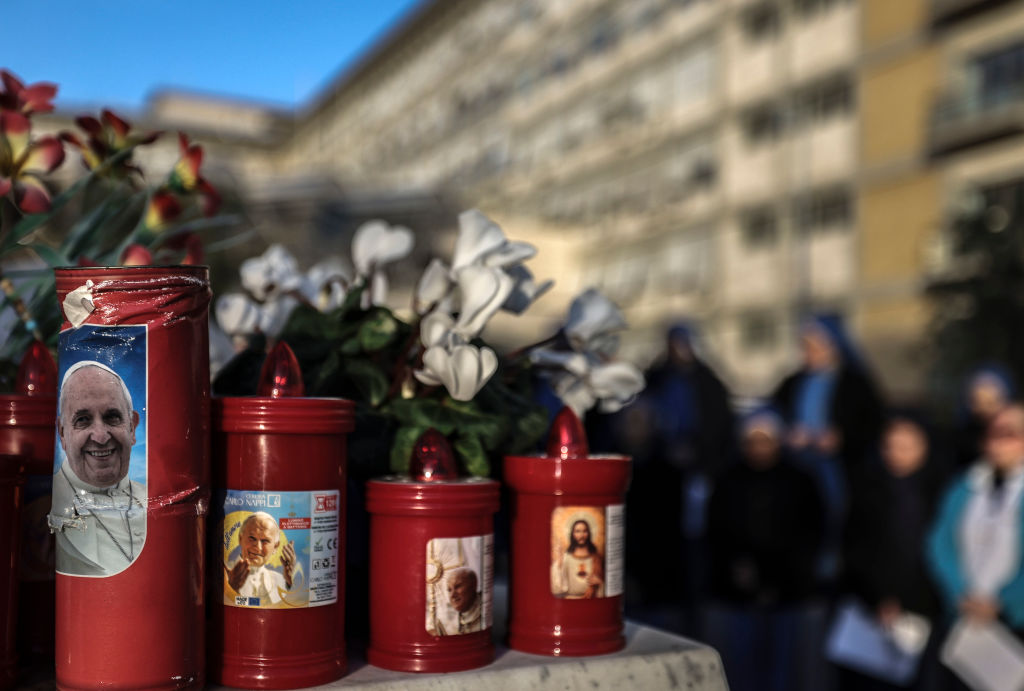
The eyes of the Catholic world are focused on Agostino Gemelli Hospital in Rome, where Pope Francis remains hospitalized for a number of health issues.
Here’s what to know about the Pope’s health situation—and what experts think it says about the risks of respiratory infections in older people.
[time-brightcove not-tgx=”true”]
A slew of health developments
The Pope was admitted on Feb. 14 for bronchitis, a viral infection that causes inflammation of the airways in the lung, making it difficult to breathe. While there, he developed additional infections that required him to remain under the care of doctors, and soon after developed pneumonia in both lungs, according to the Vatican.
Over the Feb. 22 weekend, the Pope had an “asthma-like respiratory crisis” for which he required oxygen. He has also received blood transfusions after being diagnosed with low platelets, which help the blood to clot, the Vatican said.
The combination of health issues has kept the Pope from performing his public duties, including weekly prayers on Sundays, but his doctors have recently said he is alert, joking, and continuing to work, as well as reading messages from well-wishers around the world.
Read More: Parkinson’s Patients Have a New Way to Manage Their Symptoms
On Feb. 23, the Vatican reported that the Pope’s blood tests show signs of mild kidney failure, but that the condition was “under control.” And on Feb. 24, testing revealed slight improvement.
“The trajectory we’re seeing with the Pope is not uncommon: where he has a good day, then develops a secondary infection and a setback,” says Dr. Panagis Galiatsatos, associate professor of medicine and a pulmonary and critical care doctor at Johns Hopkins. “If the Pope can teach us anything, it’s recognizing how vulnerable older adults are.”
The risk of respiratory infections in older people
Respiratory infections are particularly dangerous for older people, whose immune systems are not as robust and able to fight off viruses and bacteria. Their response to vaccines for common infections like influenza are also weaker as a result. And as people age, the lungs become stiffer and the muscles responsible for breathing become weaker, making it harder to breathe. “That decline is important because it is robbing them of their physiological reserve to bounce back if they get an infection,” says Galiatsatos. “You supplement that with the decreasing strength of their immune system, and it’s the perfect storm of vulnerability in older adults. Viruses that most of us could shake off really plague them more.”
The Pope may be particularly vulnerable to respiratory assaults; as a young man, he had a severe bout of pneumonia that required removing part of one of his lungs, which leaves him with smaller respiratory reserves.
Older people also tend to have other health issues, including heart problems, diabetes, and—like the Pope—weakened kidney function that can make infections worse. “Respiratory infections don’t just tackle the lungs; the response to them is a whole-body affair,” says Galiatsatos. “If the whole body is struggling with heart disease, diabetes, etc., then the response from the body is not as robust.” Many elderly people also aren’t physically active and are often malnourished as their appetites dwindle, which further puts their health at risk when faced with infections.
Compounding infections can quickly progress
While younger people can fend off respiratory infections after getting sick for a few days, older people’s weaker immune systems could make them more vulnerable to picking up other viruses or bacteria, as happened with the Pope. If upper airway infections linger because of weak immune responses to fight them, they can shift into the lower airways, triggering pneumonia. “Lower airway infections are typically more severe, because we are talking about the alveoli, or lung tissue that is specifically related to oxygenation and ventilation,” says Dr. Andrew Meltzer, professor of emergency medicine at George Washington University. Many older people with influenza and other viruses can develop pneumonia if they aren’t treated properly with rest and antiviral medications.
Read More: This Is One of the Worst Flu Seasons in Decades
“These secondary infections happen because the lungs aren’t a sterile environment,” says Galiatsatos. When an already weakened immune system is recruited to fight an infection, that leaves the numerous bacteria that already live in our bodies—in the lungs, gut, and elsewhere—to activate, since they’re no longer held in check by the distracted immune cells, he says.
How to protect older adults
The best way to keep older adults safe from respiratory illnesses is to ensure they aren’t unnecessarily exposed to disease-causing viruses and bacteria. If you feel sick, for example, avoid visiting a loved one who’s elderly—and if you do, wear a mask. It’s also important to make sure their home or living environment has a good ventilation system with air filters that are cleaned or replaced regularly. Finally, say Galiatsatos and Meltzer, make sure older people are up to date on their vaccines. Though their responses to the shots may not be as robust as those of a younger person, vaccines can boost their immune systems to keep their encounters with viruses as mild as possible.
“It’s important for all of us to practice proper infectious control around that population,” Galiatsatos says.



